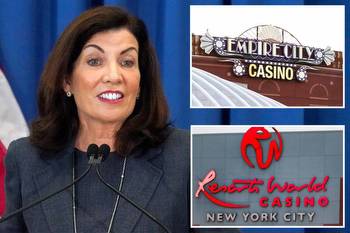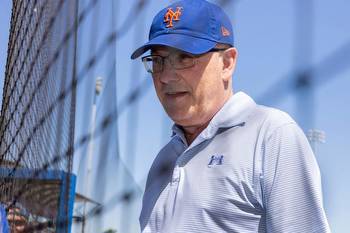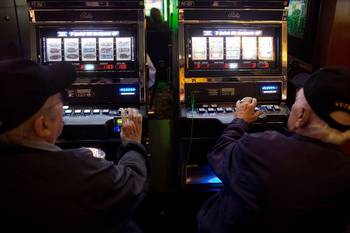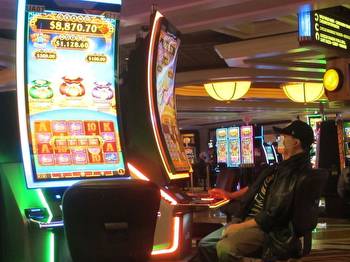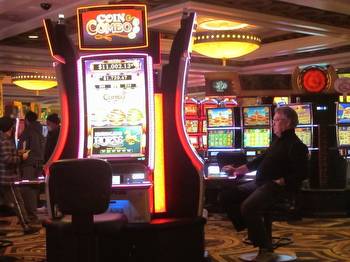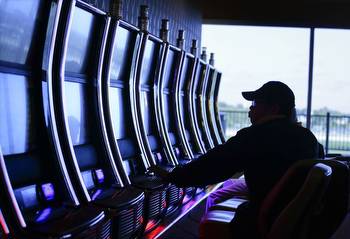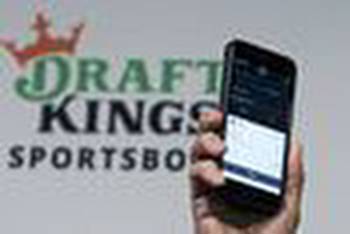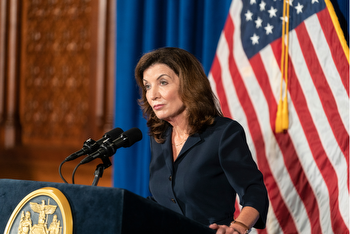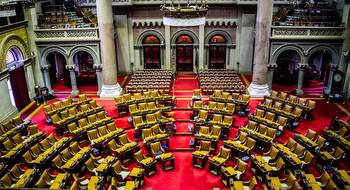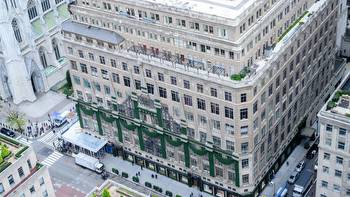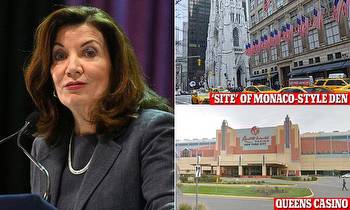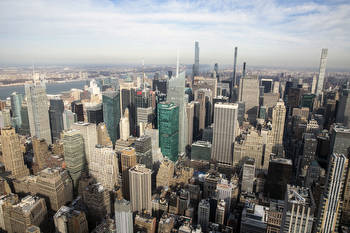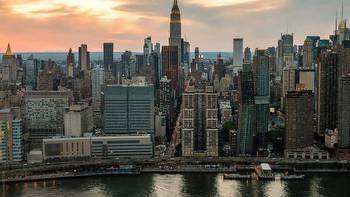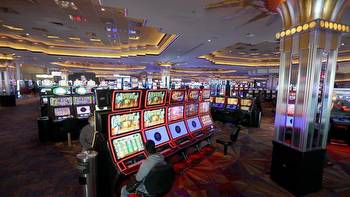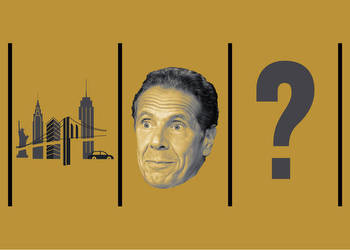A Casino Atop Saks? Lobbyists Push for Manhattan Gambling Site

A Monaco-style casino atop Saks Fifth Avenue, across the street from St. Patrick’s Cathedral. A gambling den with East River views, alongside a popular wedding venue. A Hard Rock casino in the center of Times Square.
In the next several days, as part of state budget negotiations, Gov. Kathy Hochul and legislative leaders may well hash out a deal that could authorize three casino licenses for the New York City area — a prospect that has set the Albany lobbying machine into overdrive, and sparked a creative ferment among real estate developers and casino operators eager to strike gold in New York’s glass-and-brick canyons.
Gambling companies are spending roughly $300,000 a month on a lobbying blitz to push the state to fast-track the timetable for New York’s final three casino licenses, and to influence the decision on where the casinos will be located, and who gets to operate them.
Casino interests argue that New York is losing out on tax revenue from New Yorkers gambling in neighboring states by waiting until 2023 to allow casinos downstate, as an amendment to the State Constitution passed in 2013 dictates.
Their wish may soon become a reality.
Ms. Hochul, who was endorsed by the Hotel and Gaming Trades Council in her run for a full term, is pushing to include a provision in the state budget to expedite the licenses.
Senate Democrats have also embraced the idea, and proposed that operators pay a minimum of $1 billion for each license, a potential boon for state coffers. But it remains unclear if the final budget, due April 1, will include a minimum licensing fee.
Democrats who control the Assembly, which historically has been more resistant to gambling, did not include the acceleration of casino licenses in their initial budget proposal, though the chamber is considering the licenses as part of the negotiations.
It’s not just casino companies that are pushing to expand gambling in the state.
The influential union representing hotel workers has been coordinating with some casino operators, arguing that new casinos in and around New York City — and particularly at existing electronic games facilities in Yonkers and in Queens — would lead to the employment of thousands of hotel workers who lost their jobs when the pandemic undercut the tourism industry.
About 37,000 workers represented by the recently renamed Hotel and Gaming Trades Council, or 95 percent of its members, were laid off at the height of the pandemic, according to the union. Today, nearly 10,000 of its workers remain unemployed, the union said.
Genting Group, the Malaysian gambling conglomerate that runs the Resorts World slot machine parlor in Queens, is now the union’s biggest employer. So interwoven is the union with the casino companies that it added “gaming” to its name last summer.
In several cases, the union shares lobbyists with casino companies. Jason Ortiz, the co-founder of Moonshot Strategies, now works as a lobbyist for Genting, Bally’s Corporation, and the union. Peter Ward, the union’s former president, lobbies for Genting and Bally’s, and is a registered lobbyist for the union.
“These are jobs that pay $36 an hour, have free family health care and have a pension plan,” said Richard Maroko, the current union president. “So they are in dire straits because many of them have been out of work for two years without any immediate prospect of comparable employment.”
Resorts World has invested in a public-relations campaign — New Yorkers for Responsible Gaming — that highlights how hotel workers would stand to gain from new casinos. It is being run by Neal Kwatra, a political consultant that also does work for the union. The hotel union has continued to exert its sway in Albany: It has steered at least $880,000 in campaign contributions to Democrats in Albany since 2020, according to campaign disclosure reports.
Mr. Maroko described the casino licenses as the union’s top priority in Albany right now, saying that “this is the most urgent and exigent need for our members.”
The 2013 constitutional amendment legalized up to seven full-fledged casinos — rather than just electronic games, of the sort that populate Genting’s Resorts World Casino at Aqueduct in Queens and MGM Resorts’s Empire City Casino in Yonkers.
Mayor Eric Adams’s chief of staff, Frank Carone, recently met Las Vegas Sands’s chief executive Robert Goldstein at Mr. Goldstein’s Upper East Side pied-à-terre. Mr. Adams, who as a state senator led the gaming committee, wants New York City to get two of the three licenses the state is poised to authorize, his spokesman said, rather than see one of them end up in, perhaps, Long Island. His aides have spoken with several other casino operators, too.
Many lawmakers and lobbyists in Albany believe that two of the licenses are likely to be awarded to MGM and Genting, which operate the two so-called racinos — horse racetracks that have been refashioned as casino-like properties, albeit without games like blackjack or roulette — in Yonkers and Queens, which already employ thousands of union members.
Both facilities have ties with local stakeholders and could begin operating as full-scale casinos in a matter of months, quickly generating up to 5,000 new jobs and hundreds of millions of dollars in tax revenue for the state. Indeed, both companies have struck agreements with the Hotel and Gaming Trades Council to make a priority the hiring of hotel workers who underwent a union training program to become food service and maintenance workers.
State Senator Joseph Addabbo Jr., a Democrat and chairman of the committee that oversees casinos, said that awarding two of the licenses to MGM and Genting “is probably the most popular scenario, with nothing being a given, because it should be an open process.” Genting’s Resorts World Casino is in his district.
The competition for the third, and possibly only unclaimed license, has spurred a lobbying frenzy, with pitches ranging from a casino next to the Water Club on the East River to what State Senator Liz Krueger, a Democrat from the Upper East Side helping lead state budget negotiations, describes as “a fancy Monaco-like casino on the top floor of Saks.”
A spokeswoman for Saks declined to comment.
“The third casino shouldn’t go anywhere but Manhattan,” said Michael O’Keeffe, the owner of the Water Club, who argued Manhattan is ideal for a small, high-end, Monte Carlo-style casino that will cater to a different market than casinos in Queens and Yonkers. “There’d be no taking money away from poor people who can’t afford to gamble.”
The flurry of proposals for a Manhattan casino carries no guarantee of success. Legislators are likely to require some semblance of local approval for a casino, and opposition among local legislators in Manhattan runs high.
“I think a casino would have a harmful effect on the whole atmosphere in the area surrounding it,” said Assemblyman Richard Gottfried, a Democrat who represents parts of Manhattan’s West Side, and Times Square. “I find it hard to believe that once there is one casino in Manhattan, there wouldn’t be strong pressure to have more.”
Mr. Gottfried, as well as other Manhattan lawmakers, such as Ms. Krueger, an influential chairwoman of the Senate’s finance committee, have long been seen as political roadblocks to a Manhattan casino. They are among the lawmakers who have insisted that localities have a strong say in the location of new casinos.
Indeed, the disagreement over what type of control local officials should have was one of the reasons a deal on casino licenses failed to materialize in Albany last year under former Gov. Andrew M. Cuomo. It has emerged as one of the main sticking point this year, too, though lawmakers appear more optimistic of reaching a compromise with Ms. Hochul.
One such sign: Ms. Krueger appears to have slightly tempered her objection to a Manhattan casino, provided it cater largely to wealthy gamblers, rather than low-income New Yorkers with less money to lose.
“Not sure I have softened,” Ms. Krueger said, though she said she liked the “story lines” of two Manhattan pitches in particular: A casino atop Saks and one on the East River, adjacent to the restaurant and wedding venue The Water Club. But she questioned either casino’s viability.
“Never say never, and I’m not the arbiter of anything, but my gut is, Manhattan? Pretty hard,” she said.
Ms. Krueger has also met with representatives from Hard Rock and SL Green, a commercial real estate company, who want to put a casino at SL Green’s skyscraper at 1515 Broadway in Times Square, pitching the project as a way to increase tourism in the area.
Other companies, perhaps wary of the challenges that a casino in Manhattan represents, have focused their sights beyond the borough, such as near Citi Field in Queens.
Soo Kim, the chairman of Bally’s, a Rhode Island-based gaming company with 16 casinos across the country, said that Bally’s had ruled out Manhattan because “it’s not the easiest place to get in and get out of.”
“We’re thinking more of the outer boroughs, a place where we think that we can have the convenience for people from New York City, but also to be able to pull from the suburbs,” said Mr. Kim, adding that the key was to “find a community that’s willing to host the project that you want to build.”
William K. Rashbaum contributed reporting.










